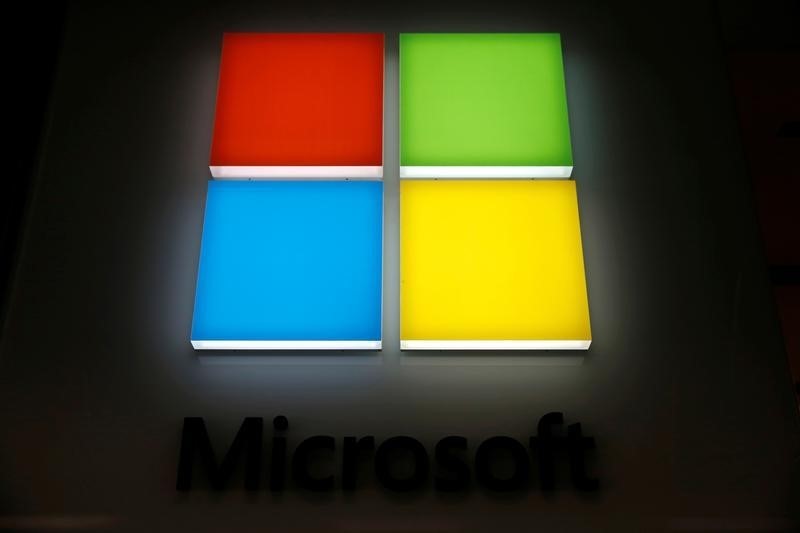By Aditya Soni and Krystal Hu
(Reuters) -Alphabet shares slumped on Wednesday after its cloud unit’s growth fell to near a three-year low, paling in comparison to Microsoft (NASDAQ:)’s relative success as the tech giants race to make money from generative artificial intelligence.
Shares of Alphabet (NASDAQ:) fell 9.6% on Wednesday, compared with a healthy 2.8% gain in Microsoft, on investor worries that the Google parent could lose share in the cloud-computing market to Microsoft.
Cloud spending by businesses preparing to roll out AI features powered a rebound in growth for Microsoft’s Azure platform in its first quarter. Growth at Alphabet’s cloud unit was dampened by its big exposure to smaller clients.
Microsoft currently trades at 28.5 times its 12-month forward earnings estimates, compared with the Google parent’s 24.93.
In the battle to tap the next growth driver for the cloud business, Microsoft has focused on its core business clients that already use many of its software services, while Google has turned to startups.
“Demand for artificial intelligence drove Microsoft’s growth. Demand among Google’s larger clients was similar, but the firm is more exposed to high-growth and startup clients, which have been more aggressive with cost-control efforts,” Morningstar analyst Ali Mogharabi said.
The share losses suggest investors are concerned that Alphabet’s focus on startups and slower roll-out of AI services was delaying the earnings boost from the new technology.
Google Cloud offers AI capabilities through its Vertex (NASDAQ:) platform. Through the DeepMind team, the company is trying to switch focus from research to product releases in the tight generative AI race with rivals such as Microsoft, which says its partnership with OpenAI allows it to move faster.
Google plans to launch a series of AI models including the much-anticipated Gemini next year, CEO Sundar Pichai said on Tuesday’s earnings call.
That timeline makes analysts wonder if it leaves a vacuum for Microsoft to grab more market share in the AI cloud with OpenAI’s GPT-4 model already available for months.
Besides its in-house model solutions, Google has also invested in AI startup Anthropic and partnered with Meta’s Llama models to offer a variety of models to its cloud users.
The company said more than half of funded AI startups are using Google Cloud, but whether its strong research and technical capability can win over big-ticket enterprise customers from the turf of Microsoft and AWS remains to be seen.
“Microsoft is using its incumbent software relationships, whereas Google is coming in as a little bit of a challenger here,” said Krishna Chintalapalli, portfolio manager at Parnassus Investments, an investor in Alphabet and Microsoft.
The results show cloud spending is coming from enterprise clients, whereas smaller businesses are reducing their expenditure, he said.
Strong AI use was responsible for a 3 percentage point boost to the Microsoft’s cloud business in the September quarter.
CEO Satya Nadella said about 40% of the Fortune 500 companies were using the test version of its “Copilot” AI service powered by OpenAI’s technology.
The company will launch the $30-a-month offering next month for its 365 service that can summarize a day’s worth of emails into a quick update.
Analysts said that will further drive up adoption of its AI services. Alphabet has also deployed AI in products such as its flagship Pixel phones and more recently tested adding generative AI to its search engine.
“Unlike many others who are touting their AI story, Microsoft is capable of delivering meaningful AI products to their customers,” brokerage D.A. Davidson said.
At least 22 brokerages raised their price targets on the software giant, pushing their median view to $400, compared with Wednesday’s price of $340 a share.
Many analysts were also optimistic about strength in Alphabet’s core search business, but they warned the weakness in the cloud business would continue.
“It’s unclear just how widespread Google Cloud optimization efforts are and how far along customers are in the journey, but expect these headwinds to persist for at least a few more quarters,” Bernstein analysts said.
AI is expected to become more of a growth driver in 2023 for Alphabet after the expected roll out of Gemini, which is a collection of large-language models.
“Early results are very promising (for Gemini),” CEO Sundar Pichai said.
Read the full article here




